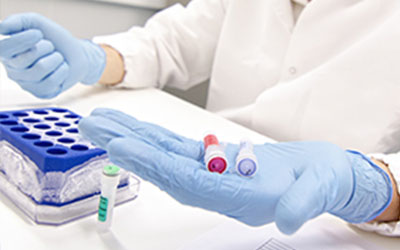Context

The prevention and treatment of most major diseases can be improved through access to quality diagnostics. In addition, clinical care is more effective with a confirmed diagnosis, laboratory monitoring of the patient, and surveillance to track morbidity and mortality trends.
Without quality laboratories to serve patients and public health surveillance based on laboratory results, healthcare for patients with serious diseases is less than optimal and public health programs are not as effective as they could be.
There remains a need for substantial investment to improve the laboratory system in Laos, especially when it comes to continuing education and the quality management system. Infectious diseases take a heavy toll in the country: respiratory disease, fevers of unidentified origin, diarrheal disease, tuberculosis, HIV/AIDS, etc.
Aims
The Lab Kham project aims to:
- Continue improvements to the Khammouane Province laboratory system and transfer activities locally;
- Strengthen continuing education for laboratory professionals;
- Improve quality assurance for the Province’s laboratories in line with local capacities.
Activities
The Lab Kham project, which has developed with a long-term view, focuses on four key activities.
First, laboratory visits and assessments are organized to identify the analyses prescribed most often and determine whether reagents are stored properly.
Next, the project provides for a training plan. All laboratory staff in Khammouane Province receive training. A guide on the interpretation of biological results and a quality assurance plan are tailored to the local context.
The active development of a network of district laboratories around the Khammouane Province laboratory has been strengthened using a “train the trainers” approach.
Lab Kham may be considered a pilot project. In the future it could be implemented in other provinces across the country.
Achievements
1
ACTIVE, AUTONOMOUS AND SUSTAINABLE LABORATORY NETWORK
8
Trainers trained
3
Training sessions
70
technicians formed
2
Training sessions for prescribing physicians
20
trained doctors
10
laboratories monitored
80
days of attendance
6
visits and audits
After an initial period of activity from 2007 to 2013, the project was revived in June 2016 when a technical assistant came on board to manage it.
In September 2016, all technical personnel from Khammouane Province received general clinical hematology training provided by the Thakhek Hospital laboratory personnel, who had undergone prior training by a technical assistant.
Afterwards, follow-up visits were made to the 10 district laboratories to ensure that laboratory personnel were successfully applying the techniques and information acquired during training. Audits were conducted at all district laboratories in the province using a WHO evaluation tool adapted to local conditions. Audit results were compared to findings from a 2013 assessment.
This audit made it possible to:
- Provide an assessment at the beginning and the end of the project;
- Reorganize the work space as necessary and carefully clean the laboratory to create a secure, optimal working environment;
- Create documents providing guidance and support to perform laboratory analyses;
- Assess in situ whether personnel apply the lessons learned in general training;
- Initiate a quality approach adapted to each local context (calibration, internal audit, comparison among technicians, 5S method, continuous improvment, etc.).
In addition, the visits marked a first step towards introducing a quality approach by setting up internal quality controls for clinical hematology parameters and calibrating the instruments in the laboratory.
For each visit, the technical assistant was accompanied by a technician from Thakhek Provincial Hospital who acts as an advisor to the laboratory, making weekly telephone calls to monitor progress. This approach builds on past achievements during capacity building for technical personnel of Thakhek Provincial Hospital (2009-2012). In addition, it ensures that the provincial laboratory will provide guidance and technical support for the network.
After carrying out activities with technical assistance, the Lab Kham project operates independently, with “immersion” internships in the provincial laboratory and quality monitoring in the district laboratories.
Partners
Operational :
- Khammouane Province District Hospitals
- Thakhek Provincial Hospital
- Khammouane Provincial Health Directorate
Funders:
- Auvergne-Rhône-Alpes Region (France)
- Mérieux Foundation
